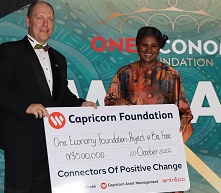
Mbeki calls for closer cooperation
 Former South African President, Thabo Mbeki this week said African regional economic intergration is one of the fundamental conditions for the success of African countries, given the reality that no country can achieve the goals of sustained growth and development on its own.
Former South African President, Thabo Mbeki this week said African regional economic intergration is one of the fundamental conditions for the success of African countries, given the reality that no country can achieve the goals of sustained growth and development on its own.
Mbeki said this while addressing the Namibia Business School Founders and Alumni dinner in the capital on Tuesday evening. He said: “ …for us to make an impact with regard to the make-up of the global economic architecture within which we must operate, requires that Africa acts together in unity precisely to enhance our bargaining power.”
He added that even though African states had achieved political liberation, they still have not acquired the means whereby they can intervene in the global economy as more or less independent actors.
Mbeki called for the further development of regional intergration into a process of African continental intergration, which will enhance the possibility for African countries to achieve their development goals, as well as increase Africa’s possibility to achieve equitable and beneficial intergration in the globalising world economy.
“Related to both these propositions is the lesson we surely have learnt by now, that we must rely more extensively and decisively on our own resources to realise our objectives, understanding that especially the developed world does not have the political will or self-interested objective justification to help us respond to our development challenges.”
Mbeki noted that the process of globalisation has, among other things, obliged even the most developed countries to come together with other countries in regional or other economic partnerships to create better conditions for their own economic success.
He suggested that African Business Schools should set themselves to train leaders (graduates) who would help the continent to achieve sustainable economic development that results in the continuous improvement of the standards of living and the quality of life of the masses while changing Africa’s place in the world economy so that it is free of the yoke of the international debt burden and (is) no longer a supplier of raw materials and an importer of manufactured goods.













































